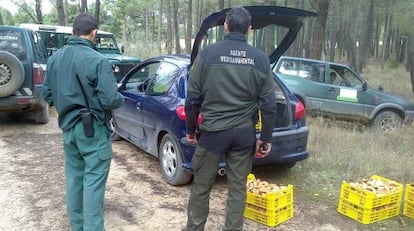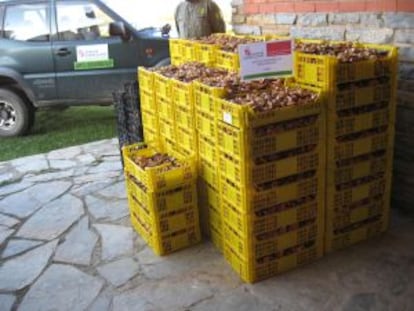Taking on the mushroom mafias
Spain’s economic crisis is driving a growing trade in illegally collected species


This fall the Civil Guard has carried out a series of operations throughout Spain as part of a crackdown on illegal harvesting of wild mushrooms that has seen organized gangs of up to 50 people camping out in woodland for weeks on end and stripping forests of valuable species.
“There is huge demand,” explains a spokesman for the force’s Seprona environmental protection unit. “It’s like drugs: there is always somebody prepared to buy.”
He adds that so far the Civil Guard has been unable to establish who is behind the practice. “But it’s clear that there are wholesale buyers. The whole thing is very well organized and structured. So far, we don’t know who is selling the mushrooms.”
Authorities say almost 700 complaints have been filed in Soria, resulting in the seizure of 15 tons of mushrooms
“This is a problem that has been brought about by the economic crisis,” explains Arturo Notivoli, the head of Seprona in the Pyrenean province of Huesca, who adds that they first began to see camps dedicated to collection on a huge scale a few years ago. Mainly made up of Romanians, according to the Civil Guard, the gangs move around the country depending on the season and the presence of the police. Palencia, in the north of the Castilla y León region, was hard hit in 2013, but has seen no activity from mushroom gatherers this year. But in the tiny province of Soria, around 200 kilometers northeast of Madrid, and one of Spain’s richest sources of mushrooms, the authorities say almost 700 complaints have been filed by local residents, resulting in the seizure of 15 tons of mushrooms. A kilo of Lactarius deliciosus, better known in Spain as níscalos, can cost up to €30, while different varieties of boletus can reach three times that figure.
Signs posted along Soria’s backroads warn that mushroom gathering is tightly controlled and that large-scale collection is forbidden. During the season, the entire region seems dedicated to mushrooms, with hotels and restaurants offering special dishes, along with guided tours to identify species, tastings, and special markets where freshly picked mushrooms can be bought direct. Anybody wishing to collect them must have a permit issued by their local town hall, and only local residents on the electoral register can collect to sell.

In the main square of the tiny village of El Royo, nestling among the hills of Soria, Alfredo and Ángel, two locals in their sixties, are about to head out to the surrounding woodland in search of mushrooms. They say they have often come up against large groups of Romanians, but say the foreigners are in the minority. “There are many more Spaniards collecting mushrooms than Romanians, but because of xenophobia, they get all the blame, although it has to be said that they leave a lot of rubbish behind,” says Alfredo. “There are buyers who take advantage of them and then sell the mushrooms on at much higher prices.”
A local forest ranger says that this year, Soria has been particularly hard hit by unregulated mushroom gathering.
“We’ve been invaded," adds his colleague. “The problem is that the Romanians are organized: they are brought here, and what they collect already has buyers. They live in terrible conditions. They sleep out in the open on hillsides, or in vehicles, anywhere they can find shelter. They are paid much less than local people.
“They travel round Europe, they follow well-established routes, but they get into the most amazing places, locations that not even we knew about where mushrooms can be found.”
With the exception of Palencia, where large-scale collecting of mushrooms without permission is considered theft only if their value surpasses €400 (there were 60 arrests in 2013), in the rest of Spain, it is considered a minor infringement of the law, and subject at most to a small fine. But local authorities are trying to crack down on unregulated mushroom gathering by fining people for littering, or even by checking that their motor vehicles’ paperwork is in order.
There are many more Spaniards collecting mushrooms than Romanians, but because of xenophobia, they get all the blame”
The authorities in Soria say they still have little idea as to where these tons of mushrooms end up. In the entrance to the small community of San Leonardo de Yagüe one chilly November afternoon, a group of Romanians is selling crates of mushrooms out of their cars. They say this wholesale activity is legal, although others say that unlawfully collected mushrooms are sold for as little as one euro a kilo to local people with licenses, who then sell them on for up to four times that price to intermediaries.
But Álvaro Picardo, the head of the environment department in the regional government of Castilla y León, says the trade in mushrooms goes far beyond meeting local demand: “There are buyers out there who channel this unregulated trade into the wholesale markets that supply shops and supermarkets.”
In which case, what about the danger to consumers from potentially poisonous mushrooms? “The people who collect these mushrooms know what they are doing, they don’t make mistakes,” says Gabriel Moreno Horcajada, president of the Madrid Mycological Society.
There are still no figures on just how many wild mushrooms are making their way into the food chain, but Cesefor, a not-for-profit environmental group that manages Europe’s largest mushroom reserve – which covers around 400,000 hectares of woodland in Castilla y León – mushroom gathering is worth around €65 million. Meanwhile, more and more people are showing an interest in collecting their own mushrooms: in the 2013-2014 season, 65 permits were issued, twice as many as the previous year. The organization that brings together Spain’s mushroom growers says there are no national figures on the worth of the industry.
Tu suscripción se está usando en otro dispositivo
¿Quieres añadir otro usuario a tu suscripción?
Si continúas leyendo en este dispositivo, no se podrá leer en el otro.
FlechaTu suscripción se está usando en otro dispositivo y solo puedes acceder a EL PAÍS desde un dispositivo a la vez.
Si quieres compartir tu cuenta, cambia tu suscripción a la modalidad Premium, así podrás añadir otro usuario. Cada uno accederá con su propia cuenta de email, lo que os permitirá personalizar vuestra experiencia en EL PAÍS.
¿Tienes una suscripción de empresa? Accede aquí para contratar más cuentas.
En el caso de no saber quién está usando tu cuenta, te recomendamos cambiar tu contraseña aquí.
Si decides continuar compartiendo tu cuenta, este mensaje se mostrará en tu dispositivo y en el de la otra persona que está usando tu cuenta de forma indefinida, afectando a tu experiencia de lectura. Puedes consultar aquí los términos y condiciones de la suscripción digital.








































